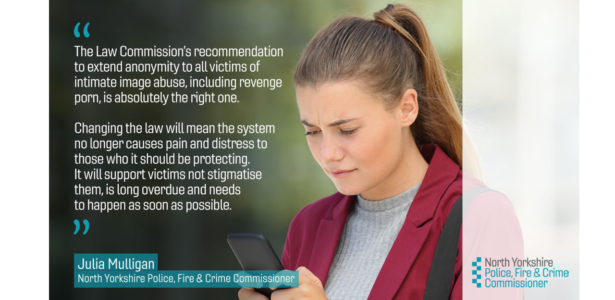Commissioner welcomes Law Commission proposals to give anonymity to revenge porn victims

North Yorkshire’s Police, Fire and Crime Commissioner has welcomed the Law Commission’s recommendation that victims of intimate image abuse, commonly known as revenge porn, should be given automatic anonymity – something Julia Mulligan has been calling for since 2015.
The conclusion comes in a report on the non-consensual taking and sharing of intimate images which finds reform of the law is needed to protect victims from harmful online behaviour including the sharing of revenge porn imagery, abusive messages and cyber-flashing.
Over the past two years, the Commission has examined the issue and last year launched a consultation on a number of proposals to improve the protection afforded to victims by the criminal law, while at the same time provide better safeguards for freedom of expression.
Julia Mulligan’s ‘No More Naming’ campaign has been calling for the law to be changed to protect the anonymity of those who have their privacy breached and their most intimate moments shared online. An online petition attracted nearly 16,000 signatures and a survey of victims in 2018 found the threat of having their identity revealed meant three-quarters did not report their crime.
In its final recommendations, published today (25 February 2021), the Law Commission said:
- Automatic anonymity for all victims of intimate image abuse.
- An expansion to the types of behaviours outlawed by existing criminal laws on taking and sharing intimate images without consent to include ‘downblousing’ and sharing altered intimate images, such as deepfakes.
- Criminalising threats to share intimate images (including other forms of ‘sextortion’).
- Four new offences that cover taking, sharing and threats to share intimate images without consent.
Julia Mulligan, North Yorkshire Police, Fire and Crime Commissioner, said:
“The Law Commission’s recommendation to extend anonymity to all victims of intimate image abuse, including so-called revenge porn, is absolutely the right one. I welcome their report, not just for this conclusion but for all their attempts to future-proof laws so they reflect the way technology is changing our world.
“In 2015, I launched the ‘No More Naming’ campaign to protect the identities of those who have had their most private moments shared online. 16,000 people signed our petition and victims shared their stories with us to try and make sure others didn’t have to go through what they had. The Commission’s conclusions are down to their bravery and commitment.
“Changing the law will mean the system no longer causes pain and distress to those who it should be protecting. It will support victims not stigmatise them, is long overdue and needs to happen as soon as possible.”
